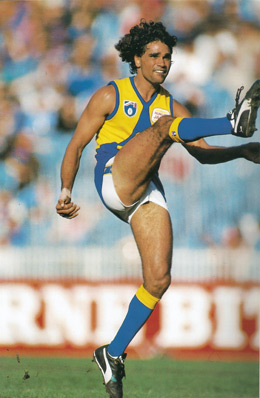|
HALL OF FAME INDUCTEE Chris Lockey Lewis |
|
|---|---|
| Year Inducted | 2013 |
| Date of Birth | 16th March 1969 |
Player 1986-2001
Games 274 (Claremont 54, West Coast 215, Western Australia 5)
Goals 287 (Claremont 28, West Coast 259, Western Australia 0)
Honours: Premiership player 1992, 1994 (West Coast), 1996 (Claremont), West Coast Club Champion 1990, All Australian 1990, West Coast Eagles Team 20 (2006) and Team 25 (2011),
Indigenous Team of the Century 2005, West Coast Hall of Fame (Inaugural) 2011
Sublime ball handling and disposal skills were evident early in Chris Lewis, an indigenous forward/ruck rover who earned the huge respect of his teammates for his team orientation and commitment. He is also recognised as playing an important role in the defeat of racism in football during a long and at times controversial career in which he became the second indigenous player to achieve 200 VFL/AFL games and also the second West Coast Eagle to achieve the milestone.
Christopher Lockley Lewis was born in Osborne Park with a notable pedigree in Australian football, his father Irwin and brothers Clayton and Cameron all being significant WAFL players. Like his father and brothers, Chris attended Christ Church Grammar School, and his exceptional football ability demanded that an exception be made to allow him to play in the First XVIII whilst in Year 10. He first came under public notice when his wizardry carried Christchurch to victory over St Marks in the curtain raiser to the 1984 State of Origin game against Victoria and the following year he was a vital member of the famous inaugural WA Teal Cup winning team. He debuted for Claremont in league football in 1986 whilst still at Christchurch but his Alcock Cup school football commitments restricted his senior exposure to the final 3 games which included a losing semi final. The newly formed West Coast Eagles were delighted to secure him as an inaugural squad member for he had been keenly sought by Footscray. At 18 years and 12 days, he was the youngest West Coast debutant in their first game against Richmond and remained so until Ben Cousins, 81 days younger, in 1996.
Lewis was an immediate success at AFL level, playing 19 games and touring Ireland with an Australian team in 1987. As a laconic and gifted half forward and occasional ruck rover he was particularly notable for his excellent foot passing skills. His goal sense yielded 29 goals in his first season and 259 overall. At his peak in 1990 when he played 22 games, Chris Lewis won the West Coast Eagles Club Champion Award and was named in the All Australian team. He was widely regarded as the best player in the land at this point and able to swing a game with a devastating burst of brilliance. More highlights came when he played in the Eagles first Grand Final in 1991 (a loss to Hawthorn) and in the premiership victories in 1992 and 1994.
The trajectory of the second half of Lewis’ senior career flattened out somewhat and was marred by several unusual incidents which resulted in suspensions. As a brilliant player of indigenous origin he became a target and, wearing his heart on his sleeve, was one of the first to speak out at a time when there was no institutional power or support for minority groups. In an early 1990’s interview with George Grljusich on the ABC, he aired concerns that predated the actions of Nicky Winmar and Michael Long and helped commence discussions that later became a moral tide against on–field racism. Besides these concerns, Lewis also battled a series of niggling injuries but continued to have an impact in 15 games in both 1997 and 1998. Three games into the 2000 season however, he announced his retirement from AFL football. He was subsequently afforded an emotional farewell by leading the team on to the ground against the Bulldogs in Round 8 at the WACA ground. In his 215 AFL games Lewis averaged a creditable 16.2 disposals per game for a forward and kicked 259 goals including bags of 7 against St Kilda in 1987 and 6 against Collingwood in 1995.
Chris Lewis is a revered figure at the West Coast Eagles. Passionate and loyal he was selected as one of the inaugural 5 members of the West Coast Eagles Hall of Fame in 2011 and now enters the West Australian Football Hall of Fame as one of the states greatest of the modern era.



